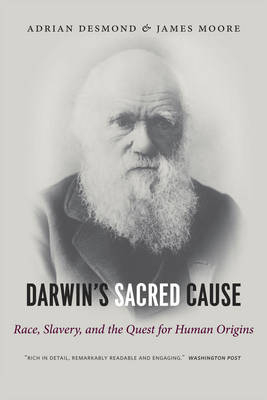
Darwin's Sacred Cause
Race, Slavery and the Quest for Human Origins
Seiten
2011
University of Chicago Press (Verlag)
978-0-226-14451-1 (ISBN)
University of Chicago Press (Verlag)
978-0-226-14451-1 (ISBN)
Originally published: Boston: Houghton Mifflin Harcourt, 2009.
There has always been a mystery surrounding Darwin: How did this quiet, respectable gentleman come to beget one of the most radical ideas in the history of human thought? It is difficult to overstate what Darwin was risking in publishing his theory of evolution. So it must have been something very powerful--a moral fire, as Desmond and Moore put it--that helped propel him. That moral fire, they argue, was a passionate hatred of slavery.
In opposition to the apologists for slavery who argued that blacks and whites had originated as separate species, Darwin believed the races belonged to the same human family. Slavery was a "sin," and abolishing it became his "sacred cause." By extending the abolitionists' idea of human brotherhood to all life, Darwin developed our modern view of evolution.
Drawing on a wealth of fresh manuscripts, family letters, diaries, and even ships' logs, Desmond and Moore argue that only by acknowledging Darwin's abolitionist heritage can we fully understand the development of his groundbreaking ideas.
There has always been a mystery surrounding Darwin: How did this quiet, respectable gentleman come to beget one of the most radical ideas in the history of human thought? It is difficult to overstate what Darwin was risking in publishing his theory of evolution. So it must have been something very powerful--a moral fire, as Desmond and Moore put it--that helped propel him. That moral fire, they argue, was a passionate hatred of slavery.
In opposition to the apologists for slavery who argued that blacks and whites had originated as separate species, Darwin believed the races belonged to the same human family. Slavery was a "sin," and abolishing it became his "sacred cause." By extending the abolitionists' idea of human brotherhood to all life, Darwin developed our modern view of evolution.
Drawing on a wealth of fresh manuscripts, family letters, diaries, and even ships' logs, Desmond and Moore argue that only by acknowledging Darwin's abolitionist heritage can we fully understand the development of his groundbreaking ideas.
Adrian Desmond is an honorary research fellow in the biology department at University College London and the author of seven other books on evolution and Victorian science, including an acclaimed biography, Huxley. James Moore's books include The Post-Darwinian Controversies and The Darwin Legend. He has taught at Harvard, Notre Dame, and McMaster University, and is professor of the history of science at the Open University. Desmond and Moore's Darwin (1991) won the James Tait Black Prize as well as three other awards; it has been widely translated.
| Erscheint lt. Verlag | 30.4.2011 |
|---|---|
| Zusatzinfo | Maps; Illustrations, black and white |
| Sprache | englisch |
| Maße | 155 x 228 mm |
| Gewicht | 703 g |
| Themenwelt | Literatur ► Biografien / Erfahrungsberichte |
| Sachbuch/Ratgeber ► Natur / Technik | |
| Geisteswissenschaften ► Geschichte ► Regional- / Ländergeschichte | |
| Geschichte ► Teilgebiete der Geschichte ► Technikgeschichte | |
| Naturwissenschaften ► Biologie ► Evolution | |
| ISBN-10 | 0-226-14451-8 / 0226144518 |
| ISBN-13 | 978-0-226-14451-1 / 9780226144511 |
| Zustand | Neuware |
| Haben Sie eine Frage zum Produkt? |
Mehr entdecken
aus dem Bereich
aus dem Bereich
Buch | Softcover (2024)
Lehmanns Media (Verlag)
CHF 27,90
Digitalisierung neu denken für eine gerechte Gesellschaft
Buch | Hardcover (2023)
Quadriga (Verlag)
CHF 27,95
Vom Perceptron zum Deep Learning
Buch | Softcover (2022)
Springer Vieweg (Verlag)
CHF 27,95


